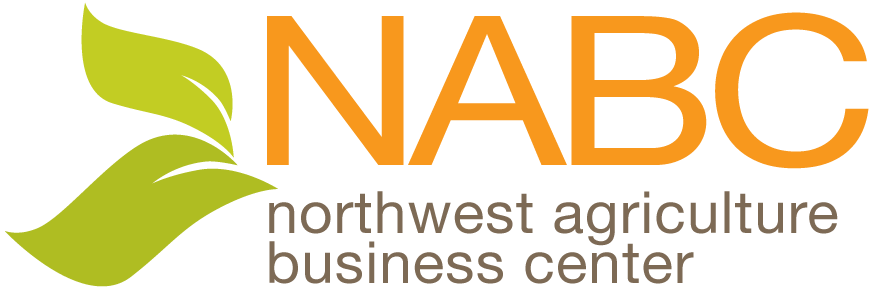College Campuses Use Food Day to Demand More Local Products in the NW
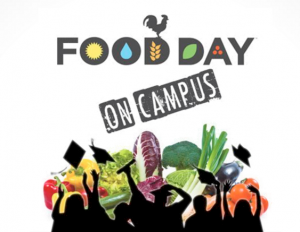 Last Wednesday, 283 campus events were held nationally to celebrate the second annual National Food Day, and 21 of those were in the NW — not bad for a region which just kicked off its Real Food Movement a year ago!
Last Wednesday, 283 campus events were held nationally to celebrate the second annual National Food Day, and 21 of those were in the NW — not bad for a region which just kicked off its Real Food Movement a year ago!
Since July 2011, the Northwest Agriculture Business Center has been partnering with the Real Food Challenge to connect more regionally produced products to university food service. Through the efforts of NABC’s Emma Brewster, who serves as Regional Coordinator for the Real Food Challenge Northwest, NABC has supported the inception of Real Food student groups at numerous NW colleges and universities, including the University of Washington, Western Washington University, The Evergreen State College, The University of Puget Sound, and Edmonds Community College.
For Food Day 2012, Emma was invited to speak at the Food Day event sponsored by the Foster Foodies at the University of Washington’s Foster School of Business. Emma presented about the changing market of university food service. A far cry from the tired clichés of ravenous college students interested only in Ramen 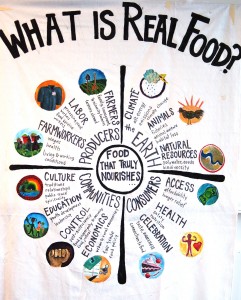 Noodles and pizza delivery, or whatever can be scrounged cheaply near campus, students increasingly want food that is healthful. Healthful not only for themselves as consumers, but healthful in the bigger picture (for producers, communities, the earth) as well. This means more local foods, more humanely-produced animal products, more fairly produced commodity items, and more of their food dollars spent on food produced in ecologically sound ways. In short, students want the money they spend on their meal plan (a mandatory expense at the majority of colleges and universities) to be spent on food that reflects their values, and more closely matches what they would choose for themselves if they had power over their own food choices. They want Real Food, the movement for which is strengthening nationally, and made its voice heard on Food Day.
Noodles and pizza delivery, or whatever can be scrounged cheaply near campus, students increasingly want food that is healthful. Healthful not only for themselves as consumers, but healthful in the bigger picture (for producers, communities, the earth) as well. This means more local foods, more humanely-produced animal products, more fairly produced commodity items, and more of their food dollars spent on food produced in ecologically sound ways. In short, students want the money they spend on their meal plan (a mandatory expense at the majority of colleges and universities) to be spent on food that reflects their values, and more closely matches what they would choose for themselves if they had power over their own food choices. They want Real Food, the movement for which is strengthening nationally, and made its voice heard on Food Day.
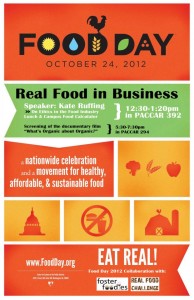 Emma’s presentation about the changing trends and maturing tastes of college students was paired with a presentation by Kate Ruffing: former food scientist and marketing strategist for some of the worlds largest food companies; current CIO of Flashpoint Strategy (business strategy for sustainability-minded food and beverages businesses); and board member of Sustainable Bainbridge. Launching off of Emma’s presentation about young consumer priorities, Ms. Ruffing spoke to the business side of the increasing demand for sustainable food products among emerging adults, and urged the MBA students in the audience to strongly consider the ethics of their career choices as they move into the food industry.
Emma’s presentation about the changing trends and maturing tastes of college students was paired with a presentation by Kate Ruffing: former food scientist and marketing strategist for some of the worlds largest food companies; current CIO of Flashpoint Strategy (business strategy for sustainability-minded food and beverages businesses); and board member of Sustainable Bainbridge. Launching off of Emma’s presentation about young consumer priorities, Ms. Ruffing spoke to the business side of the increasing demand for sustainable food products among emerging adults, and urged the MBA students in the audience to strongly consider the ethics of their career choices as they move into the food industry.
Megan Mao, a student representative of the Real Food Challenge at UW club, joined Emma at the event and presented about the use of the Real Food Calculator, a standardized assessment tool used nationally to evaluate and compare colleges’ and universities’ food purchasing. Megan and her peers conducted such an assessment of the UW’s residential and retails food purchasing in 2011. Perhaps not surprisingly, the UW is doing relatively well as compared to comparable universities and other schools in the region when it comes to local and sustainable food purchasing. With currently nearly 25% of the university’s food expenditure going towards Real (local, humane, fair, and ecologically sound) Food choices, the UW is the regional leader in sustainable food purchasing. There’s clearly still room for improvement, though, and we hope to see the UW’s local food purchasing increase annually.
NABC facilitates and supports the efforts of regional institutions of higher education increase their Real Food Percentage by introducing university buyers to local producers and facilitating farm to institution sales. Every time a university brings a new local product onto its shelves, the school’s Real Food Percentage likely increases.
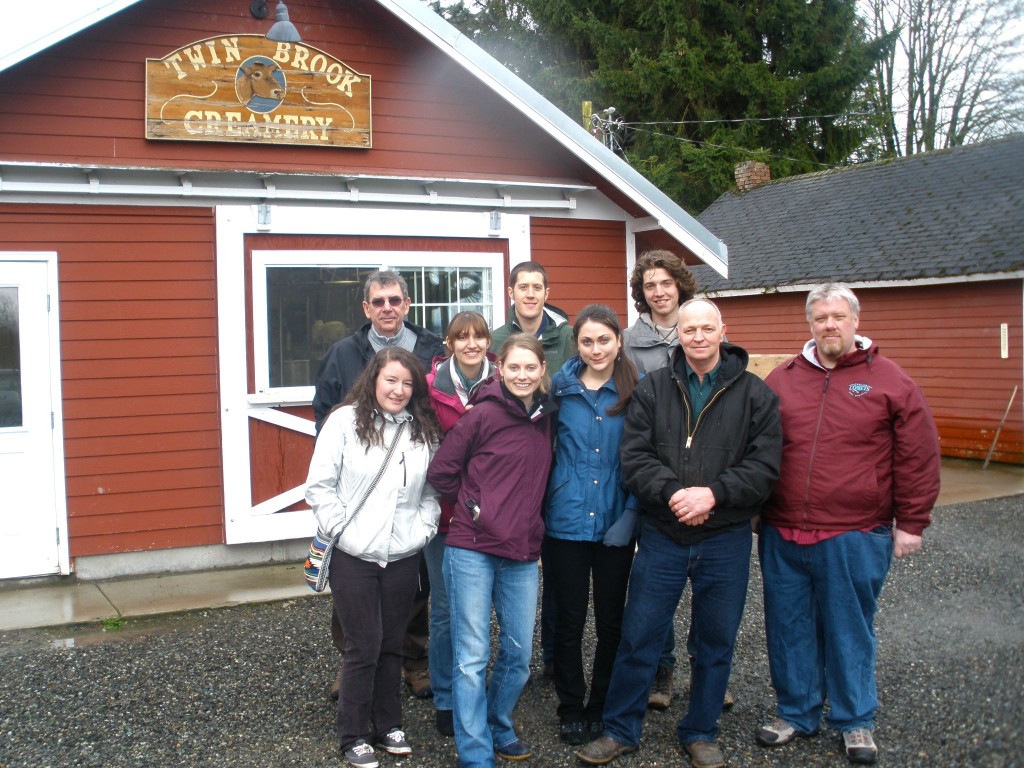
NABC Clients Twin Brook Creamery and Belly Timber were obvious choices for the college and university market. Their products are retail-ready and packaged for single-serving use — perfect for on-the-go students. For Food Day 2011, Emma arranged for the RFC UW club to sample Belly Timber and Twin Brook products on campus, and collect student signatures demanding the high quality products become available. Emma also coordinated a field trip for students and purchasing representatives from the University’s Housing & Food Services office to visit Twin Brook Creamery in Lynden, and well as the Belly Timber production facility. By Food Day 2012, both products were available on campus, gracing the shelves of the University’s new District Market!
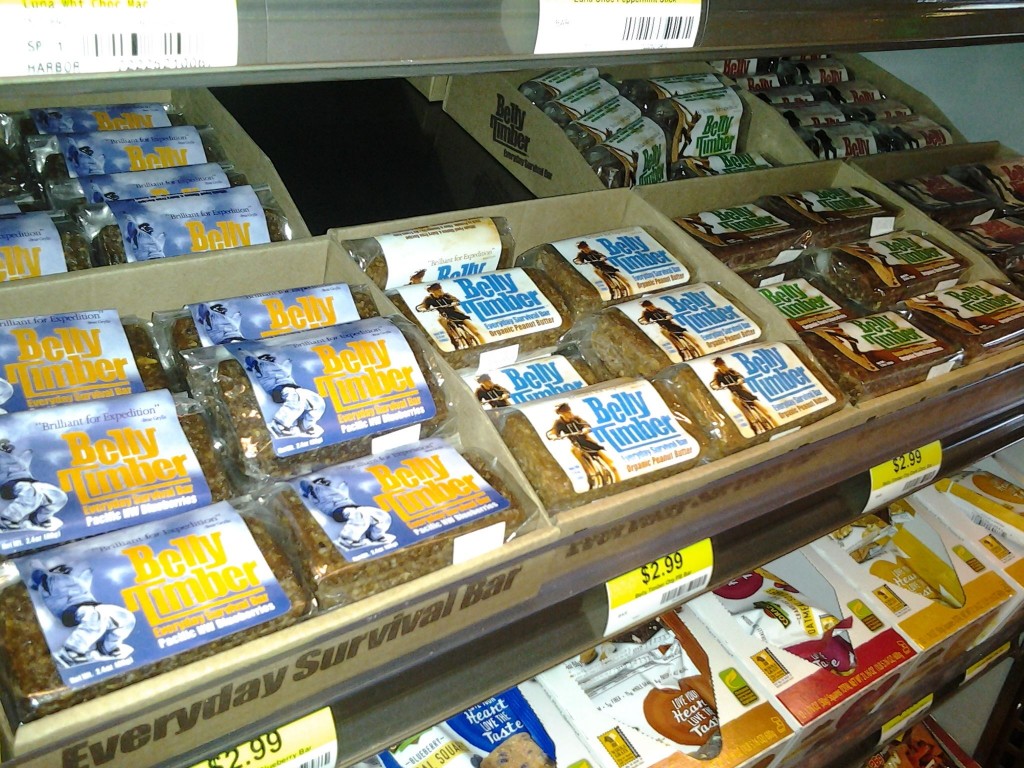
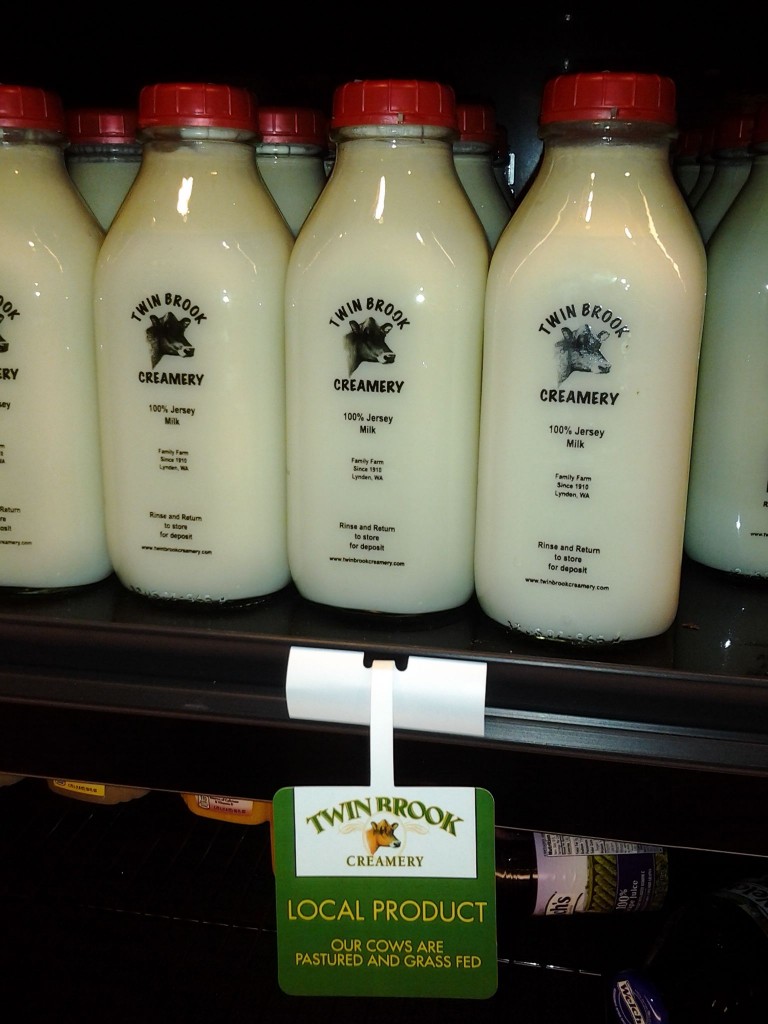
New local products on campus don’t stop there! The university has also chosen Meritage Soups (based in Redmond) as their primary on-campus soup vendor, and the UW Medical Center has been using NABC’s new Local Orbit online ordering system to buy fresh and frozen blueberries from NABC Client Bow Hill Blueberries, as means to meet the recommendations of the hospital’s employee wellness plan. Emma will continue to support UW Housing and Food Service to source local products, as well as the efforts of students rallying their dining services to buy more locally.
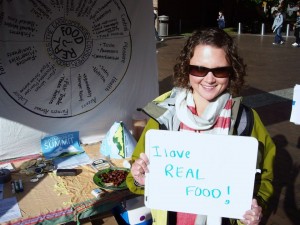 Increased local purchasing on campus could hardly be possible without the pressure of students taking The Real Food Challenge. In an effort to drum up even more student support for Real products, on Food Day, UW RFC students tabled on campus collecting signatures and showing through photo petitions that yes — students really do want more Real Food!
Increased local purchasing on campus could hardly be possible without the pressure of students taking The Real Food Challenge. In an effort to drum up even more student support for Real products, on Food Day, UW RFC students tabled on campus collecting signatures and showing through photo petitions that yes — students really do want more Real Food!
The group also supported Larry and Debbie Stap of Twin Brook Creamery at the neighboring table to encourage more students to sample the delicious new products available on campus. In the evening, the group held a third Food Day event, screening the national premier of Food Mythbusters (project director and bestselling author Anna Lappé is a long time supporter of Real Food Challenge efforts), and collecting additional student support for upcoming projects, including the establishment of a campus Food Systems Working Group to draft a food procurement policy for the university, which would ensure additional local purchasing in the future.
Hopefully such a Working Group and food policy would ensure many more Happy Food Days in coming years!
Learn more:
- See more pictures of Food Day 2012 at UW
- Read more about the impact of Food Day on campuses nationwide.
- See the Photo Petitions for Real Food collected by colleges across the nation in 2011 (including many from the NW!). 2012 photos to be released soon!
